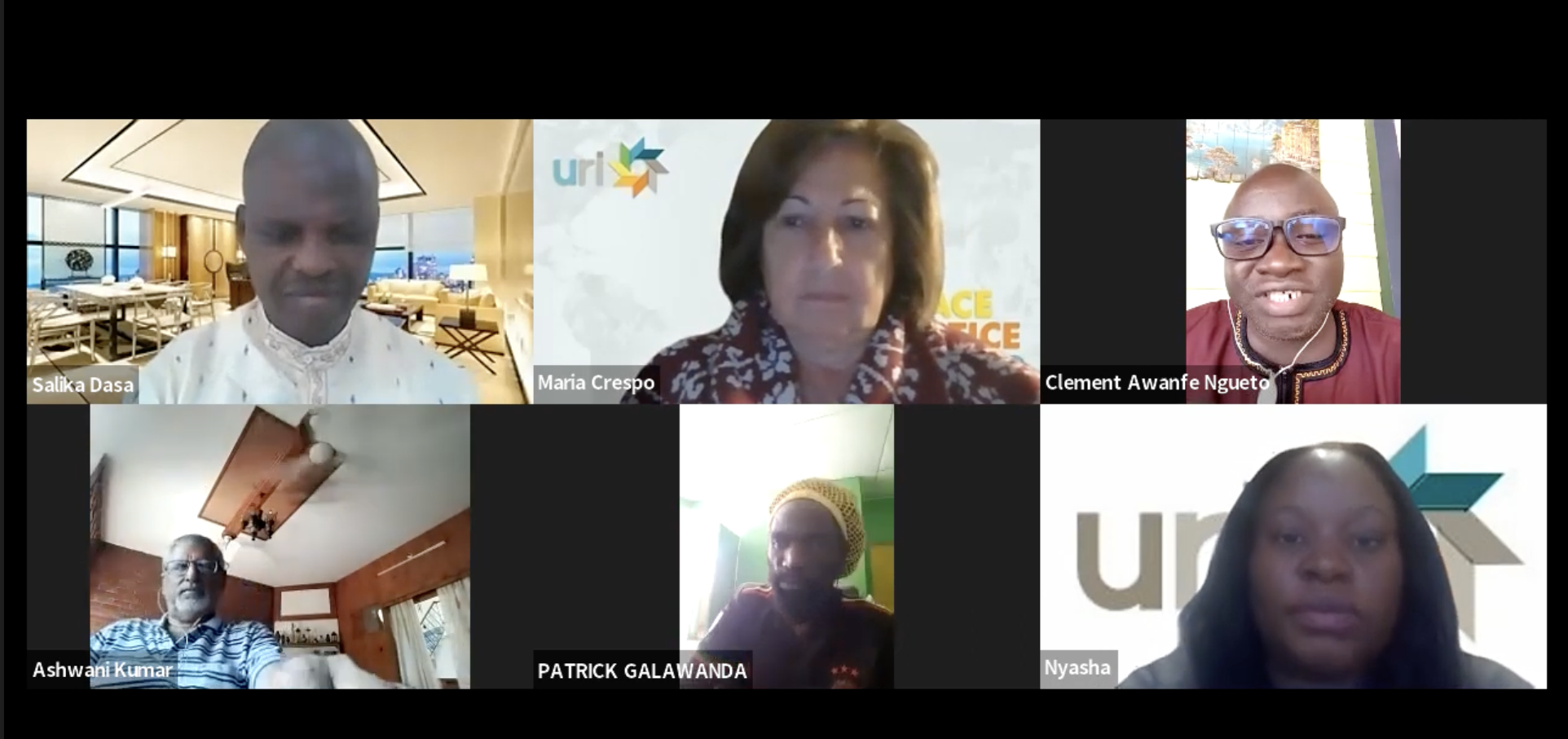Watch the video recording of the Role of Religion in Peacebuilding and Development webinar organized by URI regional coordinators in Western and Southern Africa.
On 17 August 2022, URI regional coordinators for Southern Africa and Western Africa organized a webinar that brought together participants from various URI regions, Africa, Asia, Europe, and Latin America, to explore and discuss the Role of Religion in Peacebuilding and development.
“In 1995, Bishop of the Episcopal Church, The Right Rev. William E. Swing, was asked to organize an event to celebrate the anniversary of the signing of the charter of the United Nations. In organizing that big meeting with the nations of the world, Bishop Swing understood that religions hadn't done enough to bring peace to the world, so he started a journey, a journey that each of us joined at different times to involve religions, spiritual expressions, and indigenous traditions in the effort to bring peace justice and healing to the world.” Maria Crespo, Director of Member Support, shared this during the call.
Today, some communities are still experiencing religiously and culturally motivated violence. This has affected socio-economic development and hindered co-existence. Since its inception, URI has focused on unifying religions, cultures, and indigenous traditions to restore peace and harmony in the world.
“If you look at Africa, almost 90% of the people identify with one religion or the other, so using religion in peacebuilding frameworks is very important because it is easy to pass on peace and development messages.” Abdu Katende, URI Global Trustee for Africa.
“Inner peace is very essential. It can be reached through prayer and meditation. Inner peace within yourself can influence external peace in the society.” Kayira mentioned this during the webinar.
Religion, culture, and indigenous traditions play a critical role in restoring respect for humanity and love for one another and shaping our beliefs, attitude, and actions. Also, the concept of peace, love for one another, and the environment is embedded in the teachings and practices of various religions, cultures, and indigenous traditions. In many communities, religious leaders are seen as a uniting factor, respectable members of the community, and figures of guidance and counsel.
“In some places, religious leaders are the voice of the voiceless.” Abdu Katende added.
Peace is also a prerequisite for sustainable development in countries. It plays a crucial role in the economic development and growth of communities. It also highlights the importance of collective effort in peacebuilding initiatives.
“The world today is considered a global village. You cannot have peace when your neighbor is not in peace. All of us are witnessing the effect of the war between Russia and Ukraine; the world is suffering from a food and fuel crisis.” Clement Awanfe, President of Global Compassion Cooperation Circle.
“Peace facilitates the growth of our investment, and where there’s no peace, there’s no growth.” Kayira from Malawi shared.
Keynote speakers and participants shared their experiences and best practices in peacebuilding work and the efforts that they are engaged in.

Ambassador Mussie Hailu, URI Director of Global Partnerships, highlighted that URI Africa is working diligently with the African Union to bring the 55 member states to respect the Universal Declaration of human rights.
“URI Africa is now working strategically with the African Union on freedom of religion or belief, and in this endeavor, we're also trying to introduce the golden rule, which says to treat others the way you want to be treated, so if I want my religion my culture my way of dressing my way of worship to be protected and respected, I have to also do the same.” Ambassador Mussie Hailu.
Clement Awanfe, who was one of the participants, believes that peacebuilding is also about being able to support one another. He mentioned that peacebuilding is a daily effort and a process you work towards day after day. During the call, he encouraged participants to implement dialogue principles for peacebuilding activities. Clement urged participants to engage in dialogue as it connects people easily and helps them learn and understand one another.
“I created Global Compassion with a passionate team. The first goal was to carry out a project in peacebuilding and support the local communities in Cameroon with basic needs. My organization is helping people have access to water and helping families who lost their homes to floods. Clement Awanfe, President of Global Compassion Cooperation Circle.
“With dialogue and storytelling, we can break big barriers and bridge people,” Clement added.
“One of the key takeaways from the discussion was that peace is a decision, and it starts with an individual. You are never too small to make a difference, and peace begins with a smile and embracing diversity.” Nyasha Mukaratirwa, Regional Coordinator for URI Southern Africa.
URI, together with Cooperation Circles around the world, is committed to implementing and supporting initiatives and efforts aimed at peacebuilding with the intent of building cultures of peace, justice, and healing in all communities.
